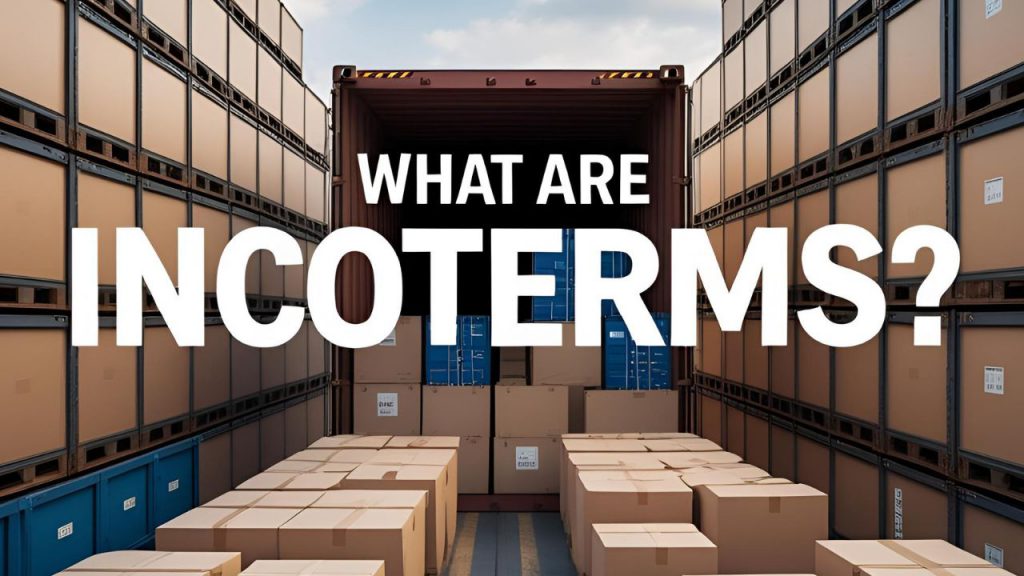Ever found yourself in the middle of a heated dispute over who exactly is responsible for shipping damages, clutching a printout of the incoterms as if it was the Magna Carta? If so, you’re not alone in the labyrinth of freight contracts where these critical shipping terms reign supreme. “What are Incoterms in shipping?” is a question that even seasoned logistics coordinators find themselves asking, albeit quietly, at times, given how often these pivotal terms are misapplied, leading to costly misunderstandings.
Incoterms, or International Commercial Terms, have their roots as an initiative of the International Chamber of Commerce, designed to streamline international trade. Since their inception in 1936, these terms have evolved, particularly with the 2020 update, to address the ever-growing complexities of global commerce. Whether you’re dealing with FOB or CIF, these terms delineate who pays for shipping, who shoulders the insurance, and who owns the risk during transit—a handy trifecta when delayed deliveries transform into tortuous tales of cargo claim management.
In this article, we’ll navigate the intricacies of Incoterms, shedding light on the 2020 revisions, explaining how to choose the right term for your transaction, and highlighting the nuances in liability management. As we demystify each aspect, we hope to equip you with the knowledge to transform a contentious freight mishap into a smooth, proactive logistics operation, turning potential disputes into nothing more than yesterday’s shipping tales.
H1 What are Incoterms—and how do they affect cost and liability?
Incoterms, short for International Commercial Terms, play a pivotal role in the shipping process by defining contractual shipping terms and liabilities on a global scale. Introduced by the International Chamber of Commerce, Incoterms establish precise responsibilities for buyers and sellers in international trade, impacting who pays shipping costs, handles insurance, and owns the risk in transit—a trifecta sure to brighten any logistics coordinator’s day.
Consider the difference between two common terms: Free on Board (FOB) and Cost, Insurance, and Freight (CIF). In FOB contracts, the buyer bears the onus of risk and cost once goods are loaded onto the shipping vessel. In CIF arrangements, however, the seller continues to handle insurance and transportation costs to the port of destination—although don’t be surprised if disputes about insurance claims arise when cargo goes astray.
Table: Major Incoterms Overview
Incoterm | Who Pays Shipping? | Who Handles Insurance? | Who Owns Risk in Transit? |
|---|---|---|---|
EXW | Buyer | Buyer | Buyer |
FOB | Buyer | Buyer | Buyer |
CIF | Seller | Seller | Seller up to port |
These terms, still misunderstood with alarming regularity, underscore the importance of clearly defined trade terms to prevent costly disputes.
Introduction to Incoterms
In the complex world of international shipping, the term “Incoterms” might sound deceptively simple—at least until it’s time to negotiate those freight contracts. So, what are Incoterms in shipping? They are standard international commercial terms created by the International Chamber of Commerce (ICC) to facilitate smooth trade and avoid disputes. Despite their legal precision, one could humorously observe that misunderstandings are far too common, often leading to perplexing shipping disputes.
Incoterms play a crucial role in clearly defining the responsibilities between buyers and sellers for shipping goods internationally. Imagine the potential chaos without deciding who handles insurance or pays shipping costs! Let’s look at a few major Incoterms:
Incoterm | Who Pays Shipping? | Who Handles Insurance? | Who Owns Risk in Transit? |
|---|---|---|---|
EXW | Buyer | Buyer | Buyer |
FOB | Buyer | Seller | Buyer |
CIF | Seller | Seller | Seller, until goods are on board |
DDP | Seller | Seller | Seller |
DAP | Seller | Buyer | Seller, until delivery point |
By understanding Incoterms, professionals can better navigate shipping contracts, mitigate risks, and perhaps even find a bit of humor in the otherwise meticulous world of global logistics. For deeper insights into managing cargo claims efficiently, consider exploring cargo claim management strategies.
The Purpose and Importance of Incoterms
Incoterms, short for International Commercial Terms, were established by the International Chamber of Commerce to create clear, universally accepted definitions and rules regarding the responsibilities of buyers and sellers in international trade. They serve a critical purpose: standardizing shipping terms to minimize misunderstandings and disputes in global transactions. Perhaps ironically, misunderstandings about Incoterms are as common as misplaced bills of lading, yet knowing these trade terms is essential for effective supply chain management.
The importance of Incoterms lies in their ability to delineate who is responsible for paying shipping costs, handling insurance, and bearing risk during transit. This ensures both parties have a precise understanding of their liabilities, providing a framework for cost and risk allocation that is crucial for avoiding disputes and managing cargo claim management effectively, a service detailed in Hatfield & Associates’ comprehensive guide.
In a global trade environment where customs clearance and delivery of goods across borders are fraught with legal complexities, Incoterms act as essential navigational tools. By adopting these standardized terms, companies can prevent costly misunderstandings and enhance their competitive edge through strategic logistics planning.
Overview of Incoterms 2020 Update
The Incoterms 2020 update marks a significant evolution in the way international shipping and procurement are structured. Released by the International Chamber of Commerce (ICC), these terms streamline international trade by clarifying the responsibilities of buyers and sellers in the delivery of goods. One noteworthy change includes the replacement of Delivered at Terminal (DAT) with Delivered at Place Unloaded (DPU), emphasizing the unloading obligation. Another enhancement is the explicit incorporation of security-related requirements, reflecting the growing emphasis on risk management in global supply chains.
A key feature of Incoterms 2020 is the improved guidance on allocation of costs, now meticulously detailed for each term—ensuring fewer disputes arising from vague contractual expectations. The update also encourages the use of Free Carrier (FCA) by providing clarity on flexible options, like the on-board bill of lading application, thus facilitating smoother customs documentation.
For logistics professionals navigating these updates, understanding the nuances between terms such as Free on Board (FOB) and Cost, Insurance, and Freight (CIF) is indispensable. In the competitive arena of global trade, mastering these Incoterms could mean the difference between a well-managed shipping experience and a costly mix-up.
Key Changes in Incoterms 2020
The Incoterms 2020 revision represents a pivotal advancement in international trade logistics, engineered to address the evolving complexities of global shipping. Introduced by the International Chamber of Commerce (ICC), the updated terms aim to clarify the roles and expectations between buyers and sellers, mitigating the risk of disputes and misunderstandings—an effort that logistics coordinators might cheekily note should come with an honorary degree in interpretational gymnastics. Crucially, this revision enhances clarity around obligations, cost allocations, and security, ensuring that contractual specifics align with modern trading realities.
Replacement of DAT with DPU
One of the most significant shifts in Incoterms 2020 is the substitution of Delivered at Terminal (DAT) with Delivered at Place Unloaded (DPU). This change underscores the obligation for sellers to handle the unloading of goods, offering precision that benefits international procurement leads. Where previously the “terminal” could evoke a labyrinth of interpretations—did someone say terminal?—DPU streamlines clarity by applying to any designated place. This shift acknowledges the diverse logistics hubs in modern supply chains where goods might reach their final destination well beyond conventional ports.
Under DPU, the seller is responsible for both delivery and unloading at the specified location, a nuance that should not be underestimated. For those concerned about the punctiliousness of unloading operations, DPU acts as a contractual lighthouse, steering clear of potential liabilities that might arise from improper unloading procedures. As such, it affords supply chain analysts a robust framework to mitigate risks, offering a smoother, more predictable logistics orchestration.
Changes in Insurance Obligations (CIF vs. CIP)
Incoterms 2020 also revises insurance obligations, a move set to resonate deeply with procurement officers attuned to the intricacies of international contracts. In the terms of Cost, Insurance, and Freight (CIF) and Carriage and Insurance Paid to (CIP), the onus of insurance is explicitly delineated, ensuring that parties are not left wrestling over who should bear the brunt of the proverbial “act of God” insurance claim.
For CIF, the insurance requirement remains adequate for the contract—a pragmatic choice for sea and inland waterway transport. However, Incoterms 2020 ups the ante for CIP, mandating a more comprehensive “all risks” cover traditionally reserved for air and multimodal transport. This nuanced expectation means logistics coordinators must be vigilant in aligning insurance policies to avoid a sea of paperwork—almost as vast as the ocean itself—during cargo claim disputes.
The difference between CIF and CIP in terms of insurance coverage is paramount. CIF’s insurance responsibilities lean towards a baseline cover, leaving the buyer to decide if additional measures are warranted. Conversely, CIP obligates the seller to deploy robust insurance, offering a safety net that extends significantly further into the buyer’s operational sphere. For procurement teams, this delineation could be pivotal in managing unexpected liabilities, making all the difference between a seamless delivery and a contentious insurance claim saga.
In conclusion, the Incoterms 2020 changes are not just updates; they are strategic reimaginings tailored to the complexities of modern trading, ensuring that everyone along the supply chain has a clearer, legally-sound path to follow.
Categories of Incoterms
Understanding the categories of Incoterms is essential for logistics coordinators, supply chain analysts, and international procurement leads who navigate the complex waters of global shipping. Incoterms, short for International Commercial Terms, are standardized trade terms published by the International Chamber of Commerce (ICC) that define the responsibilities of buyers and sellers in international transactions. They serve as contractual shortcuts that outline who is responsible for shipping, insurance, and risk during transit. The two primary categories of Incoterms are Multimodal Transport Incoterms and Sea and Inland Waterway Transport Incoterms. Each category has specific applications depending on the mode of transportation used in the transaction.
Multimodal Transport Incoterms
Multimodal Transport Incoterms are designed for transactions involving more than one mode of transportation, such as shipping goods by sea and then transporting them via rail or truck. These terms are versatile, allowing goods to be moved seamlessly across various transportation methods without renegotiating the terms of sale. Incoterms like EXW (Ex Works), FCA (Free Carrier), CPT (Carriage Paid To), CIP (Carriage and Insurance Paid to), DPU (Delivered at Place Unloaded), DAP (Delivered at Place), and DDP (Delivered Duty Paid) fall under this category.
Each term denotes specific responsibilities and liabilities:
- EXW (Ex Works): The seller’s responsibility ends when the goods are ready for pickup at their premises. Buyers must bear all costs and risks thereafter.
- FCA (Free Carrier): The seller delivers the goods, cleared for export, to the carrier specified by the buyer.
- CPT and CIP: The seller pays for transportation to the specified destination. Under CIP, the seller also secures insurance coverage.
- DPU, DAP, and DDP: The seller takes on increasing levels of responsibility, from unloading goods to covering duties and taxes.
Having a clear understanding of these terms is vital for managing costs and risks associated with international shipping.
Sea and Inland Waterway Transport Incoterms
Sea and Inland Waterway Transport Incoterms specifically apply to transactions conducted via sea or inland waterways. These terms are critical for transactions where the primary mode of transport is by sea, such as bulk shipments and maritime freight. Key Incoterms in this category include FAS (Free Alongside Ship), FOB (Free on Board), CFR (Cost and Freight), and CIF (Cost, Insurance, and Freight).
- FAS (Free Alongside Ship): The seller fulfills their obligation once the goods are placed alongside the vessel at the port of shipment. The buyer assumes the risk from this point forward.
- FOB (Free on Board): The seller’s responsibility ends once the goods are on board the vessel at the port of shipment, shifting risk to the buyer once cargo is secured on the ship.
- CFR (Cost and Freight): The seller covers the cost of transporting goods to the port of destination, but risk transfers to the buyer once the goods are loaded onto the vessel.
- CIF (Cost, Insurance, and Freight): Similar to CFR, with the seller also securing insurance for the goods while in transit.
These Incoterms clearly define who pays for shipping, handles insurance, and owns the risk during transit. Without a solid grasp of these terms, logistics coordinators may find themselves adrift in a sea of unforeseen liabilities. Understanding and correctly applying these terms can help avoid costly misunderstandings and disputes during the shipping process.
How to Choose the Right Incoterm
Selecting the appropriate Incoterm for your shipment is akin to choosing the right shoes for an event—while they might not make or break the occasion, they significantly influence your comfort and confidence. In international shipping, the stakes are even higher, as choosing the wrong Incoterm can lead to unforeseen costs, liability debates, and delivery delays that can resemble a shipping “who-dun-it.” The significance of Incoterms lies in their utility as standardized contractual terms that explicitly define the responsibilities of buyers and sellers.
Factors Affecting Incoterm Selection
When deciding on an Incoterm, one must consider a variety of factors that influence the selection process. These factors include the nature of the goods, the mode of transportation, and the degree of control the buyer or seller wishes to maintain throughout the shipping process. Each of these elements plays a vital role in making an informed decision, ensuring that costs and responsibilities are clearly understood.
The nature of the goods can dictate how risks and responsibilities should be allocated. For instance, fragile or perishable goods might require more control over transportation and insurance coverage. Meanwhile, the preferred mode of transportation—whether sea, air, or land—may influence which party is better positioned to handle specific logistical challenges. Additionally, the level of control desired by either the buyer or the seller can sway the decision towards an Incoterm that aligns with their strategic interests. By carefully weighing these factors, both parties can select an Incoterm that balances risk and control appropriately.
Impact on Shipping Costs
As one might imagine, the choice of Incoterm can have a profound impact on shipping costs, much like adding a surprise topping to your ice cream sundae. While it may seem delicious to offload responsibilities onto the other party, this can come back to bite if not executed correctly. Certain Incoterms, such as Cost, Insurance, and Freight (CIF), bundle transportation costs alongside insurance, potentially simplifying budgeting for buyers.
Nevertheless, simplification rarely comes without a price. Opting for terms that require taking on more responsibilities, like Ex Works (EXW) or Free on Board (FOB), can shift cost burdens dramatically. Under EXW, the buyer must take a more hands-on approach, managing shipping and customs, which may lead to hidden costs if not carefully planned. Therefore, understanding each Incoterm’s cost implications is instrumental in avoiding surprises and fostering strategic budgeting in your supply chain endeavors.
Implications for Liability
Navigating liability under Incoterms is akin to a courtroom drama, but without the captivating dialogue. The significance of correctly identifying liability cannot be overstated, as it determines who shoulders the burden when things go awry. Incoterms allocate liability between parties based on who controls the shipment and at what point during transit that transfer occurs.
Different Incoterms assign risk at pivotal stages of the shipping journey. With Delivered Duty Paid (DDP), the seller carries the responsibility until the goods reach the buyer’s doorstep, while under Free on Board (FOB), the buyer assumes risk once the goods are loaded onto the transport vessel. Such distinctions prove crucial when something goes awry, as they determine who would rightly file a cargo claim. Misunderstandings in liability divisions not only inflate costs but can also lead to disputes and potential legal battles, highlighting the necessity for clear and precise agreements supported by a deep understanding of Incoterms.
By leveraging these insights, logistical planners and procurement leads can adeptly navigate the intricacies of international shipping. In doing so, they ensure seamless transactions, shielded by the armor of well-crafted Incoterms, transforming potential pitfalls into a smoothly executed dance through global supply chain complexities. For further guidance, explore cargo claim management to understand how savvy Incoterm management augments your defense against unforeseen liabilities in shipping.
The Role of Incoterms in Trade Contracts
Incoterms, short for International Commercial Terms, play a pivotal role in trade contracts, establishing clear responsibilities for sellers and buyers. Originating from the International Chamber of Commerce, these terms are crucial for delineating who foots the bill for shipping, insurance, and risk during transit.
In the labyrinth of international trade, Incoterms like FOB (Free on Board) and CIF (Cost, Insurance, and Freight) are indispensable for avoiding disputes. FOB, for instance, places transit risk on the buyer after goods are loaded; contrast this with CIF, where the seller bears insurance obligations until goods reach the destination port.
Consider this table:
Incoterm | Who Pays Shipping? | Who Handles Insurance? | Who Owns Risk in Transit? |
|---|---|---|---|
EXW | Buyer | Buyer | Buyer |
FOB | Buyer | Seller | Buyer |
CIF | Seller | Seller | Seller |
DDP | Seller | Seller | Seller |
DAP | Seller | Buyer | Seller |
Proper understanding of these terms mitigates risks and reduces cargo claim complexities. For a deeper dive, Hatfield & Associates offers resources on cargo claim management, helping businesses navigate these intricate waters. Ultimately, Incoterm literacy is a strategic asset in today’s global trade.
Understanding Cost Allocation in Incoterms
Understanding cost allocation in Incoterms is vital for professionals managing freight contracts and logistics operations. Incoterms, or international commercial terms, are predefined rules published by the International Chamber of Commerce (ICC) that outline the responsibilities of sellers and buyers in international trade. They provide clarity on cost responsibilities, such as transportation, insurance, and risk in transit, significantly impacting budget considerations.
Imagine a scenario involving Free on Board (FOB) versus Cost, Insurance, and Freight (CIF). Under FOB, the buyer assumes all costs and risks once goods are loaded onto the vessel. However, CIF places the costs of insurance and freight on the seller up to the port of destination, making it a more expensive, yet less risky choice for the buyer.
Consider a simple table for quick reference:
Incoterm | Who Pays Shipping? | Who Handles Insurance? | Who Owns Risk in Transit? |
|---|---|---|---|
FOB | Buyer | Buyer | Buyer |
CIF | Seller | Seller | Seller until port |
Misinterpretations can lead to shipping disputes, yet a grasp of Incoterms can improve cargo claim management. For a deeper dive into handling logistics claims, Hatfield & Associates offers expert guidance in cargo claim management by emphasizing Incoterm literacy. Understanding these terms is not just good practice—it’s a competitive edge.
Liability and Risk Management with Incoterms
In the intricate world of international shipping, Incoterms are the unsung heroes—or occasional villains, depending on one’s grasp of them. These standardized trade terms redefine who holds the responsibility and liability at various stages of the shipping process, thereby quelling disputes before they begin.
Misunderstandings about Incoterms, akin to forgetting your passport at home before an international flight, can lead to considerable headaches. For instance, under Free on Board (FOB), the buyer owns the risk once goods are loaded on the ship. A common misconception might inadvertently leave the buyer exposed during transit mishaps. Conversely, Cost, Insurance, and Freight (CIF) mandates the seller to cover insurance until the goods reach the port of destination. Yet a foggy understanding can lead to disputes over who files an insurance claim if things go awry.
A trusted partner in logistics, such as Hatfield & Associates, can play a pivotal role in cargo claim management by mastering Incoterm intricacies, thereby enhancing proactive logistics strategies.
In embracing Incoterm literacy, businesses can secure a competitive edge, deftly navigating the complex waters of global trade while minimizing liability. For official guidelines, consult sources like the International Chamber of Commerce.
Common Mistakes and How to Avoid Them
Navigating the labyrinthine world of contracts often leads to more than a few misconceptions. In the realm of international shipping, missteps with Incoterms are as frequent as a delayed flight. Here are some of the common pitfalls and savvy maneuvers to dodge them.
- Assuming the Same Definition Globally: Not every country interprets Incoterms identically. Be sure to refer to the official guidelines from the International Chamber of Commerce to steer clear of interpretive blunders.
- Neglecting to Specify Versions: Simply stating “FOB” is like saying “meet me at the airport” without mentioning terminal or time. Always specify the Incoterm version to ensure both parties are on the same page.
- Ignoring Insurance Needs: Terms like CIF mandate the seller handles insurance, but opting for minimal coverage could leave you exposed. Review insurance requirements meticulously to prevent expensive surprises.
- Overlooking Cost Implications: Free on Board (FOB) vs. Cost, Insurance, and Freight (CIF) isn’t just an alphabet soup—it’s a significant shift in who bears the cost burden. Always analyze cost implications to avert financial overreach.
Transcend these common traps by establishing clear, precise, and mutually agreed-upon terms in your contracts, transforming potential disputes into seamless transactions.
Conclusion: The Future of Incoterms in Global Trade
As global trade continues to evolve, the role of Incoterms in shaping international commerce is indispensable. These contractual shipping terms help define the responsibilities and liabilities in freight contracts, ensuring clarity between buyers and sellers. However, as supply chains become more complex and technology continues to disrupt logistics, the future of Incoterms will likely involve digital enhancements and adaptations to emerging trade scenarios. Will they ever become a foolproof system devoid of misunderstandings? One can dream.
The latest Incoterms (2020) already adapt to the needs of global e-commerce and changing international trade legislations. Looking ahead, we might see the incorporation of cyber-security clauses or finer delineations for multi-modal transport. Yet, the primary challenge remains: ensuring stakeholders are not only aware but thoroughly comprehend the implications of each term.
For logistics coordinators and supply chain analysts, this means that Incoterm literacy is not just an asset, but a strategic imperative. By proactively understanding and applying these terms, professionals can navigate the treacherous waters of international shipping with improved precision—gaining a competitive edge in a continuously shifting trade environment.
Frequently Asked Questions
Incoterms (International Commercial Terms) are standardized three-letter trade terms published by the International Chamber of Commerce that define the responsibilities of buyers and sellers in international transactions. They matter because they clearly specify who pays for shipping, who arranges insurance, and most importantly, when risk transfers from seller to buyer. Without Incoterms, international trade would be riddled with disputes over responsibilities and costs. They serve as a universal language that prevents misunderstandings and ensures both parties know exactly what they're responsible for throughout the shipping process.
FOB (Free on Board) and CIF (Cost, Insurance, and Freight) are two commonly used Incoterms with significant differences. Under FOB, the seller's responsibility ends when goods are loaded onto the ship at the port of origin. The buyer assumes all costs and risks from that point, including ocean freight, insurance, and import clearance. With CIF, the seller pays for the ocean freight and insurance to the destination port, though risk still transfers to the buyer once goods are on board the ship. CIF is often preferred by buyers who want the seller to handle more of the shipping logistics, while FOB gives buyers more control over shipping arrangements and potentially lower costs.
The Incoterms 2020 update introduced several key changes. First, DAT (Delivered at Terminal) was replaced with DPU (Delivered at Place Unloaded), clarifying that the seller must unload goods at any agreed place, not just terminals. Second, insurance requirements were differentiated between CIF and CIP - CIF maintains minimum coverage while CIP now requires higher "all risks" coverage. The update also includes more detailed cost allocation explanations for each term and provides clearer guidance on security-related requirements. Additionally, FCA now allows for bills of lading to be issued after loading, addressing a common issue in container shipping.
Choosing the right Incoterm depends on several factors: your experience with international shipping, control preferences, cost considerations, and risk tolerance. If you're new to importing, terms like DDP (Delivered Duty Paid) where the seller handles everything might be easier but more expensive. If you have reliable freight forwarders and want cost control, FOB or FCA might be better. Consider the nature of your goods (fragile items might need more seller involvement), your relationship with the trading partner, and local expertise at destination. Also factor in whether you want to handle insurance yourself or have the seller arrange it. The key is balancing cost savings against the complexity you're willing to manage.
Common Incoterm mistakes include: not specifying the year/version (e.g., just writing "FOB" instead of "FOB Shanghai Incoterms 2020"), assuming terms mean the same thing in domestic trade, misunderstanding when risk transfers versus when costs transfer, using sea freight terms (like FOB) for air or land shipments, not clarifying the exact delivery point, assuming minimal insurance under CIF is adequate for valuable cargo, and forgetting that Incoterms don't cover property transfer or payment terms. Another critical error is not understanding that some terms like EXW place export clearance responsibility on foreign buyers who may not be equipped to handle it.
Incoterms directly impact who must arrange insurance and who can file claims when cargo is damaged. Under terms like CIF and CIP, sellers must provide insurance, but coverage levels differ - CIF requires only minimum coverage while CIP requires comprehensive coverage. For terms like FOB, FCA, or EXW, buyers must arrange their own insurance. Crucially, who owns the risk at the time of damage determines who files the insurance claim, not who arranged the insurance. For example, under CIF, even though the seller buys insurance, the buyer owns the risk during ocean transit and must file any claims. This distinction often causes confusion and delays in claim settlements. Always ensure insurance coverage matches the point where you assume risk under your chosen Incoterm.




